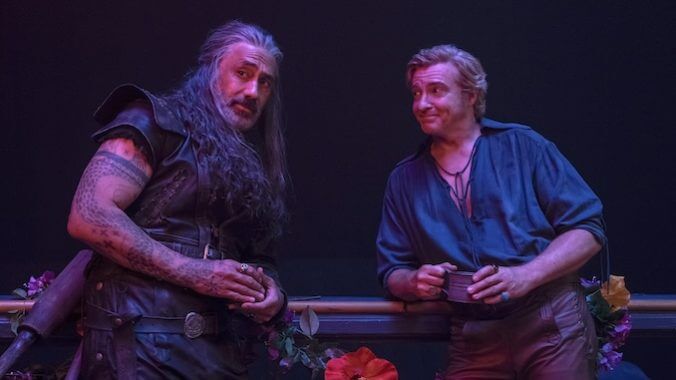Our Flag Means Death Creator David Jenkins Reflects on the Season 2 Finale and Has Hope for Season 3
Photo Courtesy of Max
The second season of Our Flag Means Death gave its adoring fans a new Pirate Queen, a crew musical drag party, masochist lesbians innkeepers, a lot of battles, and plenty of gay pirate lovers—including Stede Bonnet (Rhys Darby) and Ed Teach / Blackbeard (Taika Waititi) figuring themselves out so they could reunite. The whole season was a love letter to the fandom that embraced Season 1 with such verve and then loudly demanded it return for Season 2.
The season finale, Episode 8 titled “Mermen,” co-written by David Jenkins and John Mahone, had the fandom on pins and needles, worried that the series would somehow break fan-favorite Stede and Ed apart once more, or that the blasting apart the Republic of Pirates would kill off members of the beloved ensemble cast. Instead, the finale is one full of laughs, romance, and bittersweet endings and beginnings.
Happy to unpack the finale, Our Flag Means Death creator David Jenkins got on a Zoom with Paste Magazine to explain the creative impact of the show’s Season 1 “bubble” status in creating Season 2, if the audience feedback changed how they wrote this season or the finale, and if there’s more story to tell on the gay high seas.
Note: This interview has been edited for length and clarity.

Paste Magazine: Going back to the fan reaction to Season 1, a second season seemed assured. But then major management and content shifts were happening at WBDiscovery and Max, which delayed the pick-up. When you finally did get the Season 2 order, did you fundamentally change your thoughts about the story you wanted to tell?
David Jenkins: No. I think they’ve been a dream to work with. Every time I’ve made something, there’s been major corporate upheaval and I am starting to think that every time anybody makes something, particularly now, there’s major corporate upheaval. The first season of this television show took place in one era. The second took place in still another era that has since ended. And if there was going to be a third season, it would take place in an entirely new era.Throughout it all, we’ve had the same execs. Suzanna Makkos has been with the show for both of those seasons and they’ve been nothing but supportive.
In terms of us in the [writers’] room, we just try to mind our own business, and make sure we can pay for everything.
Paste: As the season has progressed, have you been surprised by the audience’s reaction to any particular story lines?
Jenkins: Well, I’m not trying not to be as plugged in as I was in the first season. I’m just trying to let it have its own life. But I love how excited everybody was about Izzy (Con O’Neill) singing. Everyone wants the full “La Vie en Rose” recording from Con, which is beautiful.
I love that Ed and Stede getting together and having sex was not a titanic explosion. It was more like, “Of course they’re gonna have sex. They’re together, so that beat is gonna happen.” And I love the general acceptance of Buttons (Ewen Bremner) turning into a bird, which is the most ludicrous story point.
-

-

-

-

-

-

-

-

-

-

-

-

-

-

-

-

-

-

-

-

-

-

-

-

-

-

-

-

-

-

-

-

-

-

-

-

-

-

-

-








































